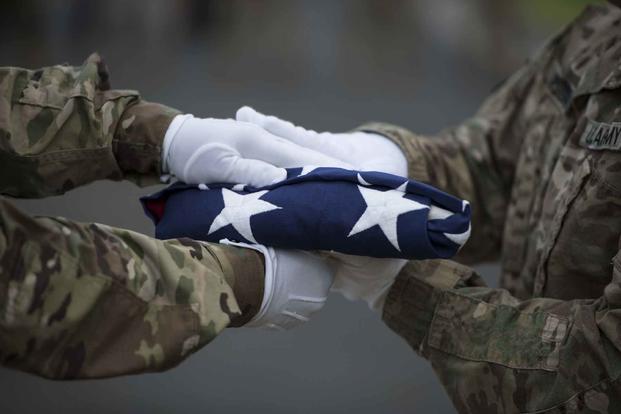The opinions expressed in this op-ed are those of the author and do not necessarily reflect the views of Military.com. If you would like to submit your own commentary, please send your article to opinions@military.com for consideration.
In 1950, three service members from New York's 21st Congressional District -- Sgt. Howard R. Belden, Cpl. Clifford S. Johnson, and Cpl. Walter A. Smead -- were serving in the 7th Infantry Division deployed to North Korea. That November, many units in the division suffered heavy casualties during the valiant, but deadly, battle at Chosin Reservoir.
The three brave heroes from Upstate New York were listed as missing in action after the battle, and for nearly 70 years, their families were left in the dark regarding the tremendous sacrifices that their relatives had made.
That was until 2018 when President Donald Trump, while serving in the White House, met with North Korean Leader Kim Jong Un and secured the return of more than 55 boxes that contained the remains of American veterans killed during the Korean War. The Defense POW/MIA Accounting Agency (DPAA) team successfully identified Belden, Johnson and Smead from these boxes and notified their families so they could give them a proper burial.
These brave service members are among the thousands that the DPAA was able to identify through their diligent work and dedication to fulfilling our nation's promise of never leaving a fallen American behind. I was truly honored and humbled to participate in two of the local ceremonies when these heroes finally returned home to their beloved families and final resting place.
As a senior member of the House Permanent Select Committee on Intelligence and the House Armed Services Committee, I recently led a large bipartisan congressional delegation to the DPAA headquarters at Joint Base Pearl Harbor-Hickam in Hawaii, where experts study historical documents, lead recovery missions, and analyze remains to identify and account for missing personnel. Through their extraordinary laboratory and fieldwork, the DPAA fulfills the promise to American service members that they will be returned home.
The work carried out by the DPAA is incredibly challenging in far-flung corners of the globe. The DPAA continues to work on identifying the more than 81,000 personnel missing from World War II, the Korean War, the Vietnam War, the Cold War, the Gulf Wars and other recent conflicts.
One of the processes by which they identify remains is through their DNA identification laboratory where family reference samples can be collected and cross-examined with the service member's records. The family reference sample is crucial in making the final determination of the remains.
As we commemorate National POW/MIA Recognition Day on Sept. 15, there is a way for you to help this valiant effort as well. Currently, the DPAA faces a difficult challenge since it lacks sufficient DNA reference samples of family members of missing service members. The accountability process is meticulous, and often the family member's DNA sample can be the determining factor needed to accurately identify missing personnel. If you are a relative of an unaccounted-for American, you can contact your service casualty office and provide a reference sample or suitable artifact that will help the DPAA identify a missing relative.
With each passing day, the window of opportunity for repatriating the missing personnel closes. Like the families of Belden, Johnson and Smead, everyone deserves the opportunity to get answers after waiting decades to know what happened to their loved ones. It is a reminder that America will do whatever it takes and go to the ends of the Earth to bring our brave heroes home.
Our missing service members gave the ultimate sacrifice safeguarding our nation, and we owe an extreme debt of gratitude to them and their families. We each have a part to play working toward the goal of having all our American heroes accounted for. I am grateful to have had the opportunity to witness the tremendous work that the DPAA carries out, and I am hopeful that my fellow Americans will answer the call to help ensure every service member can be returned home.
-- Republican Rep. Elise Stefanik represents the NY-21 District in Upstate New York.











